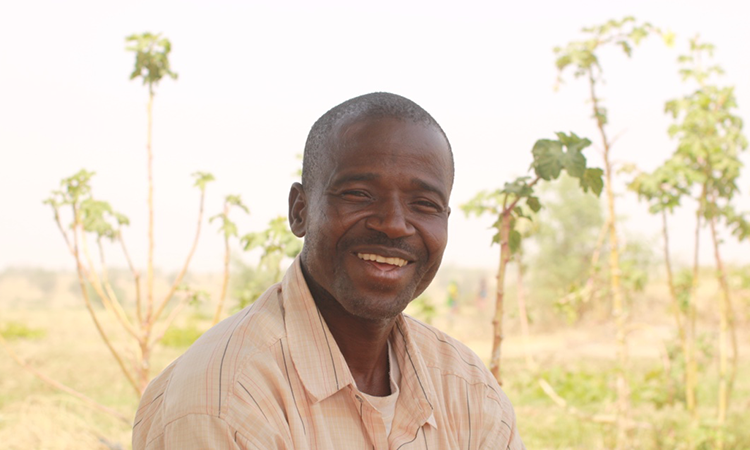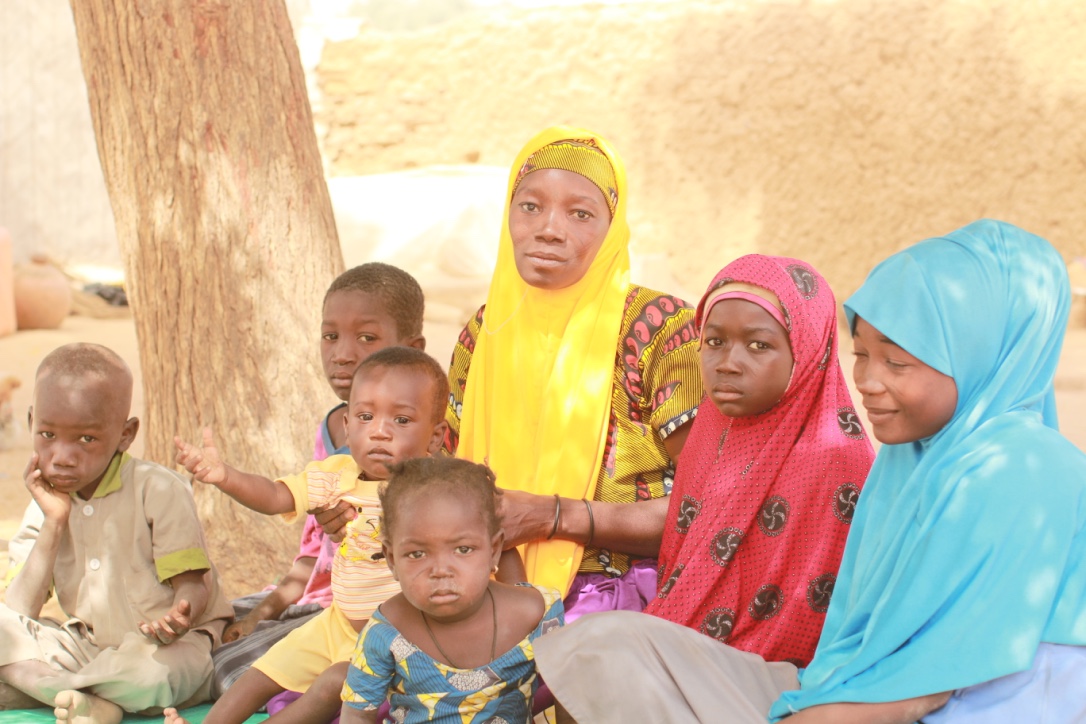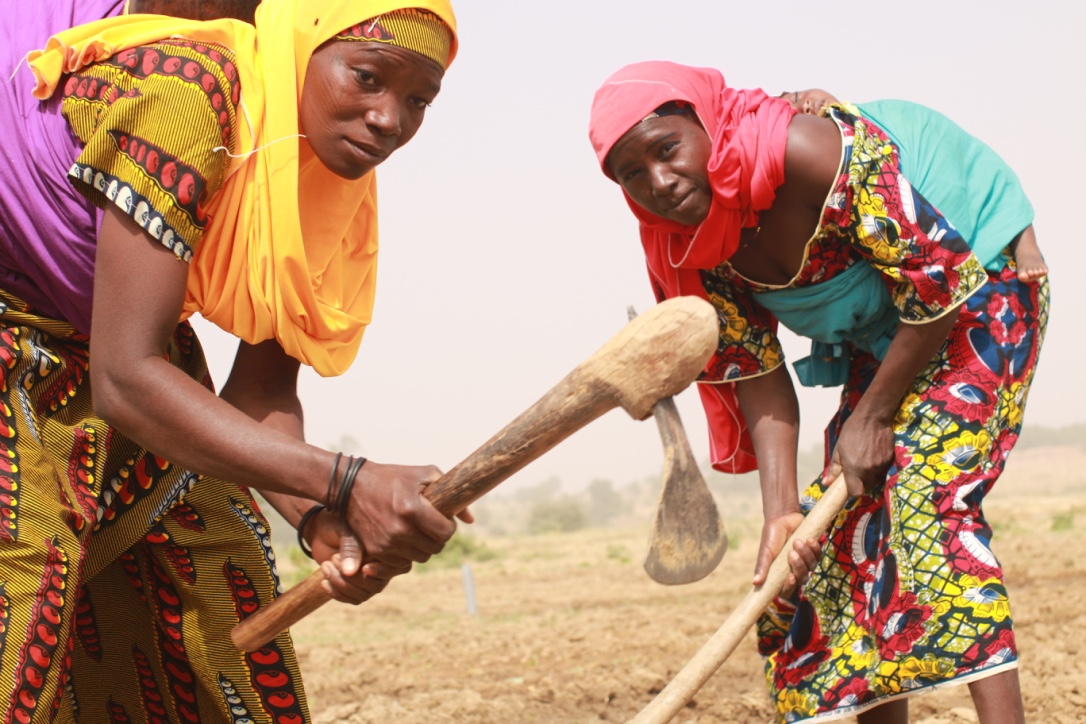Farmers find a friend in a village
agent, one of their own

Farmers find a friend in a village
agent, one of their own
Farmer Moussa Boube, 42, could talk to fellow farmers all day about seeds and plant varieties, the weather, bugs, and fertilizer. It’s a good thing, too, because in addition to farming, that’s his job. Moussa is a village agent who connects farmers in his area to markets, credit, improved seeds, and new techniques for cultivation. What he recommends, he first tries himself, on demonstration plots.
Moussa became a village agent through LAHIA, a USAID-Food for Peace-funded program implemented by World Vision in partnership with Save the Children. The program supports health and nutrition in children and helps families and communities achieve food security and resilience. World Vision experts on food security and livelihoods, markets, credit, and value chains work with Moussa and other village agents to help farmers diversify and increase their income.
“What I learned from LAHIA motivated me to do this work,” says Moussa. “This is the way to fight malnutrition and famine.”
Four-fifths of Niger’s adults are farmers who cultivate a land that seems bent on becoming desert. Most grow the same few rainy-season crops – millet, sorghum, and cowpeas – the same way their ancestors did for generations. More than half of the population lives below the poverty line; more than 30 percent lives in extreme poverty – on less than $1.90 a day.
Even if the rains come on time and in sufficient quantities, it is uncertain whether Niger’s farmers can make enough of a crop to feed their families. When debts pile up, they sacrifice pride, dignity, and independence to seek low level work away from home.
It doesn’t have to be this way, Moussa says.

Improved seeds improve lives
Last year’s short rainy season severely tested farmers in Niger’s Maradi district. Those who planted improved seeds that are selected for local growing conditions came out much better, Moussa says. “With improved seeds, plants mature more quickly so you can harvest before the end of the rainy season and get big production,” he says.
Last year was Moussa’s third as a village agent. “The first year, I didn’t sell much improved seed, but sales steadily increase once people see how well it does,” he says.
Moussa flips through his hand-written notes to see the numbers. The first year, only 82 buyers, the second year, 337. Last year, when rain was short, 487 farmers went with the improved seed.
In all of Niger, improved seeds make up only 15 percent of crops, but in World Vision’s LAHIA project, farmers plant nearly 100 percent of their crops in improved varieties.

Changing old farming ways
An individual farmer in Niger is not likely to take up new farming practices on their own, says Moussa. It’s just too hard to know what you need, get to the supplier in city, and do everything else at the right time.
“Instead, I collect all the orders, go and buy what we want, and bring it to the village,” says Moussa. “We get a better price doing it this way, plus I’m there to help them follow the instructions for best results.”
LAHIA program staff linked Moussa to the seed and fertilizer supplier, Halal. They helped negotiate pricing and a bulk order discount. Moussa also gets training from the seed supplier and reports results and comments back to the company.
After all, the proof of the new products and methods is in the growing. When they buy seed, farmers ask Moussa how it’s different to grow from before.
“People see how I grow mine and we talk about it,” he says. “I better not mess up; everybody is depending on me to share the best techniques.”
People from other villages ask Moussa to come and work with them. “I want to help small farmers, so I go and have village meetings. I talk to maybe 2,000 people sometimes, all the people in a village. I tell them about improved seeds and why I’m doing this,” he says.
Connecting to credit, markets, government services
Moussa and other village agents are key players in connecting public, private, and NGO support for Niger’s farmers. He works closely with the government agriculture department’s technical services arm. They hire him to monitor Farmer Field Schools and do other outreach services when their own technical staff are overcommitted. He’s part of the early warning system that alerts them to environmental hazards affecting crops.
Moussa’s job doesn’t end at harvest time. He keeps in touch with farmers and encourages them to store some of their grain in community warehouses so they can sell it later for a higher price. “For cowpeas, you need a special airtight bag,” he says. “They cost a bit more, but that’s the only way to store them safe from insects.”
Moussa connects farmer groups to warrantage banks where they can get loans using their crop for collateral. He watches the market. “After six months, I’ll help them look for buyers for their crops,” he says.
“We’re starting to see real change in people’s lives,” says Moussa. They are better able to cope; one bad crop or family emergency won’t wipe them out.
This project is made possible by the generous support of the American people through the United States Agency for International Development (USAID). The contents of this article are the responsibility of World Vision, Inc. and do not necessarily reflect the views of USAID or the Unites States Government.